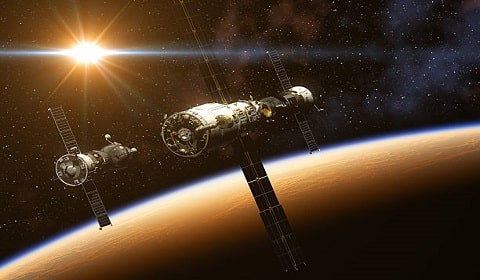
Global Space Economy
The global space economy is poised for a transformative boom, analysts forecasting an annual revenue of $1 trillion by 2040, driven by a 95% drop in launch costs. The decline in accessing space expenses is anticipated to fuel technological innovation, unlocking services like satellite broadband and manufacturing.
Several group estimate align with projections from major financial institutions, reflecting the sector’s exponential growth. The satellite market, constituting over 70% of the space economy, is undergoing a paradigm shift, expanding from traditional services to encompass consumer broadband, mobile connectivity, and IoT networks.
Despite optimism, challenges such as regulatory risks, space junk, and public perception as billionaires’ hobbies pose hurdles to the industry’s evolution. Specialist emphasizes the need for widespread acceptance to propel the space sector into diverse industries.
Table of Contents
Global Space Economy
The journey into outer space has transcended its scientific roots, morphing into a potent driver of worldwide economic expansion. Recent years witnessed remarkable shifts in the global space economy, marked by a synergy of governmental initiatives, private sector ingenuity, and international collaborations.
This evolution has propelled a surge in commercial activities, forging a new frontier for economic growth. The cosmos, once solely a realm of scientific exploration, is now a dynamic arena where governmental and private entities unite, paving the way for unprecedented advancements and opportunities that extend far beyond the confines of our planet.
This article aims to delve deeper into the multifaceted dimensions of the global space economy, backed by extensive statistical data, illuminating its diverse components and the effective impact it exerts on various sectors.
1. Economic Scenery of the Space Industry
The expansive global space economy encompasses diverse sectors, including satellite launches, space tourism, communication, exploration missions, and satellite-based services. As reported by the Space Data Association, this dynamic industry reached a remarkable valuation of $447 billion in 2022, showcasing a robust compound annual growth rate (CAGR) of 4.5% since 2015.
The surge underscores the sector’s resilience and continual evolution, with various segments contributing to its economic vitality. This growth not only reflects technological advancements but also highlights the increasing significance of space-related activities in driving innovation, connectivity, and economic prosperity on a global scale.
2. Commercial Space Ventures
Commercial space enterprises, led by industry giants like SpaceX, Blue Origin, and Virgin Galactic, stand as vital catalysts for innovation and economic expansion. Spearheaded by Elon Musk, SpaceX has revolutionized space transport, notably cutting costs. ISRO (India), and China, known as world’s factory are also trying to dominate the commercial space tourism.
In 2022, SpaceX dominated, contributing over 60% to global commercial launch revenue, underscoring the profound influence of private initiatives on the space economy.
These companies are driving a transformative paradigm shift, unlocking new possibilities and reshaping the outlook of space exploration and commerce, demonstrating the signifcant role of entrepreneurial ventures in propelling humanity’s reach into the cosmos.
3. Satellite Communication and Earth Observation
Satellite communication stands as a linchpin in our contemporary existence, facilitating worldwide connectivity and the seamless flow of information. In 2022, the global satellite industry, according to the Satellite Industry Association (SIA), yielded an astonishing $271 billion.
Earth observation satellites, pivotal for monitoring weather patterns, aiding agriculture, and guiding urban planning, make substantial contributions to this staggering sum.
Their indispensable role highlights the pervasive impact satellites have on diverse aspects of our daily lives, underscoring their pivotal position in shaping the modern technological aspect.
4. Space Tourism
The burgeoning space tourism sector, spearheaded by industry giants like Virgin Galactic and Blue Origin, commands significant interest. In 2022, the global space tourism market reached a valuation of $828 million, with forecasts predicting exponential expansion.
Technological strides and cost reductions are poised to democratize space access, unlocking fresh frontiers for exploration and economic engagement.
This shift towards civilian space travel reflects a transformative era where advancements and decreasing barriers propel the cosmos into the realm of accessible and lucrative opportunities.
5. Government Space Programs
Government space initiatives stand as pivotal catalysts for innovation and exploration. Notably, NASA, ESA, and various national agencies persist in embarking on ambitious missions, ranging from Mars exploration to lunar colonization.
Substantial financial allocations underscore the enduring commitment, with global government spending on space programs surpassing $150 billion in 2022. This funding not only fuels groundbreaking missions but also plays a substantial role in shaping the broader space economy.
Governmental contributions remain integral, ensuring sustained progress and advancements in humanity’s quest to unravel the mysteries of the cosmos.
6. Emerging Markets and International Collaborations
The space industry undergoes a transformative shift, propelled by emerging markets and global partnerships. India and China’s swift advancements in space capabilities redefine satellite launches, presenting cost-effective solutions.
Collaborations, exemplified by the International Space Station (ISS), underscore the cooperative essence of space exploration. In 2022, the Asia-Pacific region assumed a pivotal role, becoming a hub for the space industry, contributing to over 40% of global space industry revenue.
This evolution mirrors a dynamic perspective where nations collaborate, innovate, and assert their roles, shaping the trajectory of space exploration and commercial activities on a global scale.
7. Challenges and Future Outlook
As the Global Space Economy ascends, it grapples with challenges encompassing space debris control, regulatory frameworks, and geopolitical complexities. Initiatives, notably by the United Nations Office for Outer Space Affairs (UNOOSA), aim to foster international cooperation in overcoming these hurdles.
Despite challenges, the outlook for the global space economy remains sanguine, with projections foreseeing a value exceeding $1 trillion by 2030.
This optimistic trajectory stems from heightened commercialization, technological strides, and collaborative efforts on a global scale, reflecting a future where the cosmos not only captivates human exploration but also becomes a thriving hub for economic advancement.
Bottom Line
The global space economy stands as a testament to human ingenuity and the limitless possibilities of exploration. As we navigate the cosmos for scientific discovery and economic opportunities, the collaboration between governments and private enterprises will continue to define this dynamic industry.
With huge capital investments, technological advancements, and international cooperation, the space economy is poised for unprecedented expansion, unlocking new frontiers for exploration and economic prosperity. As humanity extends its reach to the stars, the Global Space Economy emerges as a key player in shaping the destiny of our shared future.





